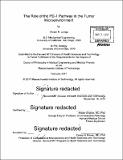The role of the PD-1 pathway in the tumor microenvironment
Author(s)
Juneja, Vikram R
DownloadFull printable version (26.51Mb)
Alternative title
Role of the programmed death-one pathway in the tumor microenvironment
Other Contributors
Harvard--MIT Program in Health Sciences and Technology.
Advisor
Arlene Sharpe.
Terms of use
Metadata
Show full item recordAbstract
The immune system has proven valuable in the fight against cancer. Therapies that unleash a T cell response against tumors have led to durable remissions in multiple cancers. Specifically, antibodies blocking the programmed death (PD)-1 pathway have been approved for the treatment of metastatic melanoma, non-small cell lung cancer, and renal cell carcinoma, amongst others. However, only a limited number of patients respond to these therapies. The field is now trying to determine combination strategies and biomarkers to extend the benefits of these therapies to additional patients in a rationale manner. A fundamental challenge towards this goal is that the cellular and molecular mechanisms underlying the efficacy of PD-1 pathway blockade are not well understood. In this thesis, we dissected the role of PD-1 and its ligands on multiple cell types in the tumor microenvironment. PD-1 is a receptor expressed on T cells upon activation, amongst other cells. Its ligands, PD-L1 and PD-L2, can be expressed on many cell types, including tumor cells. In the first section, we show that PD-1 pathway blockade can effectively combine with another therapy targeted at tumor cells themselves, BRAF inhibitors. This work provided support for ongoing clinical trials. In the second section, we show that tumor cells can protect themselves from immune eradication by expressing PD-L1, which directly suppresses the cytotoxicity of CD8* T cells. This establishes a key mechanism by which the PD-1 pathway prevents effective antitumor immunity. In the third section, we show that the inhibition of CD8* T cell cytotoxicity through PD-1 signaling is due in part to cell-intrinsic and cell-extrinsic suppression of T cell metabolism. Removing the inhibitory PD-1 signal on a fraction of cells enhances their metabolic state and allows them to become more cytotoxic. In turn, this creates a tumor microenvironment that allows additional CD8* T cells to become more functional. We show that pharmacologic agents that mimic these effects of metabolism can enhance CD8* T cell cytotoxicity. These mechanistic insights will assist in developing cancer therapies that combine PD-1 blockade with other approaches to broaden the benefit of PD-1 immunotherapy.
Description
Thesis: Ph. D. in Medical Engineering and Medical Physics, Harvard-MIT Program in Health Sciences and Technology, 2017. Cataloged from PDF version of thesis. Includes bibliographical references (pages 164-176).
Date issued
2017Department
Harvard University--MIT Division of Health Sciences and TechnologyPublisher
Massachusetts Institute of Technology
Keywords
Harvard--MIT Program in Health Sciences and Technology.